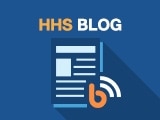Healing and Hope for Children After a Hurricane
After a year of working to keep children safe and healthy after Hurricane Maria, educators, social workers and pediatricians are seeing some rays of hope for the children of Puerto Rico and gaining valuable lessons that can be shared to help those affected by Hurricane Florence in the Carolinas or by other disasters this year.
The Office of the Assistant Secretary for Preparedness and Response (ASPR) has spent the last year working with partners from across Puerto Rico, the Centers for Disease Control and Prevention, other HHS divisions, and other federal agencies to strengthen health and social services as organizations recover from Maria and build new plans so they are ready for the next disaster.
In the weeks and months following Hurricane Maria, educators, social workers and pediatricians faced a series of daunting health crises as they scrambled to find ways to help keep the children who rely on them safe and healthy. When school resumed, teachers and administrators were called on to help traumatized students cope, work in buildings damaged by floodwaters and filled with mold, and deal with many more problems. When vaccines were needed, pediatricians did not have reliable access to them.
The scope of the health problems that face the children of Puerto Rico has been staggering, but ASPR is continuing to work with its partners to help education and healthcare providers recover from Hurricane Maria and prepare for the next disaster.
When a disaster strikes, young children are some of the most vulnerable people in a community. Many children rely on child care and early childhood education programs, including Head Start.

ASPR worked with its partners to enhance the preparedness of child care centers and Head Start facilities by providing emergency preparedness workshops across Puerto Rico. The workshops used an innovative approach to developing emergency operations plans and recovery plans. The approach went beyond the typical facility planning by integrating business continuity planning, training and emergency exercises. This turned out to be a useful model for other communities, territories and states to follow.
For older children, we focused on Puerto Rico’s schools, which are responsible for educating and providing food, shelter and a safe environment to more than 350,000 students. Over the last year, many of these children have lost their homes or returned to a home that was damaged, and many families are still trying to recover.
ASPR has supported training for more than 800 school principals in emergency preparedness, behavioral health interventions, and public health risks so they are better able to care for the students who need help now and they can be better prepared for the next disaster.
In addition, more than 2,000 teachers and social workers were trained to administer psychological first aid, an evidence-informed, modular approach to help children, adolescents, adults and families in the aftermath of disaster. Through this course, the teachers and social workers learned how to spot the signs of stress in children and how to help them cope.
Even in a healthy environment, vaccines are critical for pediatric health. But when a disaster strikes, incidents of vaccine-preventable diseases rise, something that we’re currently concerned about in the aftermath of the storm in the Carolinas.
CDC, ASPR, and the CDC Foundation worked with the Puerto Rico Department of Health Immunization Program to conduct assessments and restore services for the 224 Vaccine for Children (VFC) providers across the island. In March 2018, only 65 percent of these providers were operational and able to order vaccines. In April, that number increased to 86 percent of VFC providers, for a total of 192 providers participating in the program.
As the Carolinas begin the process of recovery, Puerto Rico and U.S. Virgin Islands continue to recover from one of the most devastating and costly hurricanes in U.S. history. The road to recovery is almost always long. HHS is committed to helping the people impacted by disasters recover, especially children and other vulnerable populations. While we assist with recovery, we also continue to help our partners put systems and plans in place that protect health and save lives when the next disaster strikes.
Community Health Centers Are Fighting on the Front Lines
A Year Later, Still Recovering from Trillion-Gallon Storms


